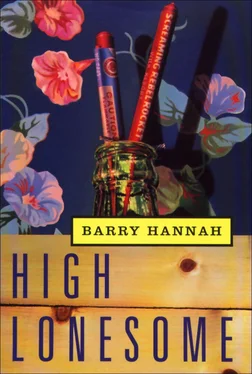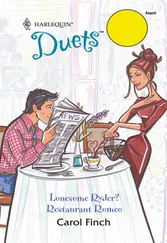Before Peter himself might have agreed on his own reasonable innocence and smiled into a faint light of the dawn, just a little rent down on any future at all. That was a far trip, and he must have enjoyed it all every time we stopped and he, like Napoleon, surveyed.
He taught me to fish, to hunt, to handle dogs, and horses, to feed poultry. Then, one day, to stand watch at the post factory over a grown black man while he left in a truck for two hours. But this I highly resented.
“I want to see if this nigger can count. You tell me,” he said, right in front of the man, who was stacking posts from the vat with no expression at all. He had heard but he didn’t look at me yet, and I was afraid of when he would.
Such were the times that Peter Howard was hardly unusual in his treatment of black help around the farm. He healed their rifts, brought the men cartons of cigarettes. He got them medical treatment and extended credit even to children who had run away to Chicago. Sometimes he would sock a man in the jaw. I don’t believe the etiquette then allowed the man to hit back. In his kitchen his favorite jest, habitual, was to say to a guest in front of their maid Elizabeth: “Lord knows, I do hate a nigger!” This brought huge guffaws from Elizabeth, and Peter was known widely as a hilarious crusty man, good to his toes. But I never thought this was funny, and I wanted my uncle to stop including me in this bullying niggerism, maybe go call a big white man a nigger.
While he was gone those two hours in the truck I figured on how mean an act this was to both me and the man stacking the fence poles. I never even looked his way. I was boiling mad and embarrassed and could not decide what the man, my uncle, wanted from this episode. Was he training me to be a leader of men? Was he squeezing this man, some special enemy, the last excruciating turn possible, by use of a mere skinny white boy, but superior kin, wearing his same name? I couldn’t find an answer with a thing decent in it. I began hating Uncle Peter. When he came back I did not answer him when he wanted to tally my figure with the black man’s. I said nothing at all. He looked at me in a slightly blurred way, his eyes like glowing knots in a pig’s face, I thought. He had on his nice fedora but his face was spreading and reddening, almost as in a fiend movie. Too, I smelled something in the car as from an emergency room I’d been in when I was hit by that car, waking up to this smell.
“Wharoof? Did you ever answer? Didja gimme the number?”
“Have you been in an accident somewhere, Uncle Peter?”
“No. Let me tell you. I have no problem. I know you might’ve heard things. This”—he lifted out a pint bottle of vodka, Smirnoff—“is just another one of God’s gifts, you understand? We can use it, or we can abuse it. It is a gift to man in his lonesomeness.” To illustrate he lifted it, uncapped it, turned it up, and up came enormous bubbles from the lip as in an old water cooler seriously engaged. He took down more than half of the liquor. The man could drink in cowboy style, quite awesomely. I’d never heard a word about this talent before.
“I’m fessin’ up. I’m a bad man. I was using you out here as an alibi for having a drink down the road there, so’s your aunt wouldn’t know. She has the wrong idea about it. But she knew I wouldn’t drink with you along.”
“You could drink right here in front of me. I wouldn’t tell, anyway.”
“Well. I’m glad to know it. It got to my conscience and I came back to make my peace with you about it. Everything between you and me’s on the up and up, pardner.”
“You mean you didn’t need me counting those poles at all?”
“Oh yes I did. It was a real job. It wasn’t any Roosevelt make-work.”
“Don’t you consider that man over there has any feelings, what you said right in front of him?”
“What’s wrong with shame, boy? Didn’t you ever learn by it? You’re tender and timid like your pop, you can’t help it. But you’re all right too.”
“Anybody ever shame you real bad, Uncle Peter?”
He looked over, his jowls even redder and gone all dark and lax, gathered up by his furious eyes. “Maybe,” he said. An honest answer would have been, had he come out with it all: “Once. And I killed him.” I wonder how much of that event was in his mind as he looked at me sourly and said, “Maybe.”
He feared my aunt, I knew it, and let me off at the house, driving off by himself while I gathered my stuff and waited for my folks to pick me up. I heard later that he did not return home for three weeks. For months, even a year, he would not drink, not touch a drop, then he would have a nip and disappear. Uncle Peter was a binge drinker. Still, I blamed my aunt, a fastidious and abrasive country woman with a previous marriage. It was a tragedy she could give him no children and I had to stand in as his line in the family. She blundered here and there, saying wrong and hurtful things, a hag of unnecessary truth at family gatherings — a comment about somebody’s weight, somebody’s hair, somebody’s lack of backbone. She was always correcting and scolding when I visited and seemed to think this was the only conversation possible between the old and young, and would have been baffled, I think, had you mentioned it as an unbearable lifetime habit. I blamed her for his drinking and his insensitivity to blacks. He was doing it to show off to her, that’s what. He was drinking because he could not stand being cruel.
The next time I saw him he had made me two fishing lures, painting them by hand in his shop. These he presented me along with a whole new Shakespeare casting reel and rod. I’d never caught a fish on an artificial lure, and here with the spring nearly on we had us a mission. His lakes were full of big healthy bass. Records were broken every summer, some of them by the grinning wives and children of his customers, so obliged to Mister Peter, Squire of Lawrence County. On his lands were ponds and creeks snapping with fish almost foreign they were so remote from the roads and highways. You would ramble and bump down through a far pasture with black Angus in it, spy a stretch of water through leaves, and as you came down to it you heard the fish in a wild feeding so loud it could have been schoolchildren out for a swim. I was trembling to go out with him to one of these far ponds. It seemed forever before we could set out. Uncle Peter had real business, always, and stayed in motion constantly like a shark who is either moving or dead. Especially when he came out of a bender, paler and thinner, ashen in the face almost like a deacon. He hurled himself into penitential work. His clothes were plainer, like a sharecropper’s more than the baron’s, and it would be a few weeks before you’d see the watch chain, the fedora, or the nice boots — the cultured European scion among his vineyards, almost.
I did not know there were women involved in these benders, but there were. Some hussy in a motel in a bad town. I’d imagine truly deplorable harlots of both races, something so bad it took more than a bottle a day to maintain the illusion you were in the room with your own species. He went the whole hog and seemed unable to reroute the high lonesomes that came on him in other fashion. But had I known I’d have only cheered for his happiness against my aunt, whom I blamed for every misery in him.
At home my father meant very well, but he didn’t know how to do things. He had no grace with utensils, tools, or equipment. We went fishing a great many times, never catching a thing after getting up at four and going long distances. I think of us now fishing with the wrong bait, at the wrong depth, at the wrong time. He could make money and drive (too slowly), but the processes of life eluded him. As a golfer he scored decently, but with an ugly chopping swing. He was near childlike with wonder when we traveled, and as to sports, girls, hobbies, and adventures my father remained somewhat of a wondering pupil throughout his life and I was left entirely to my own devices.
Читать дальше












